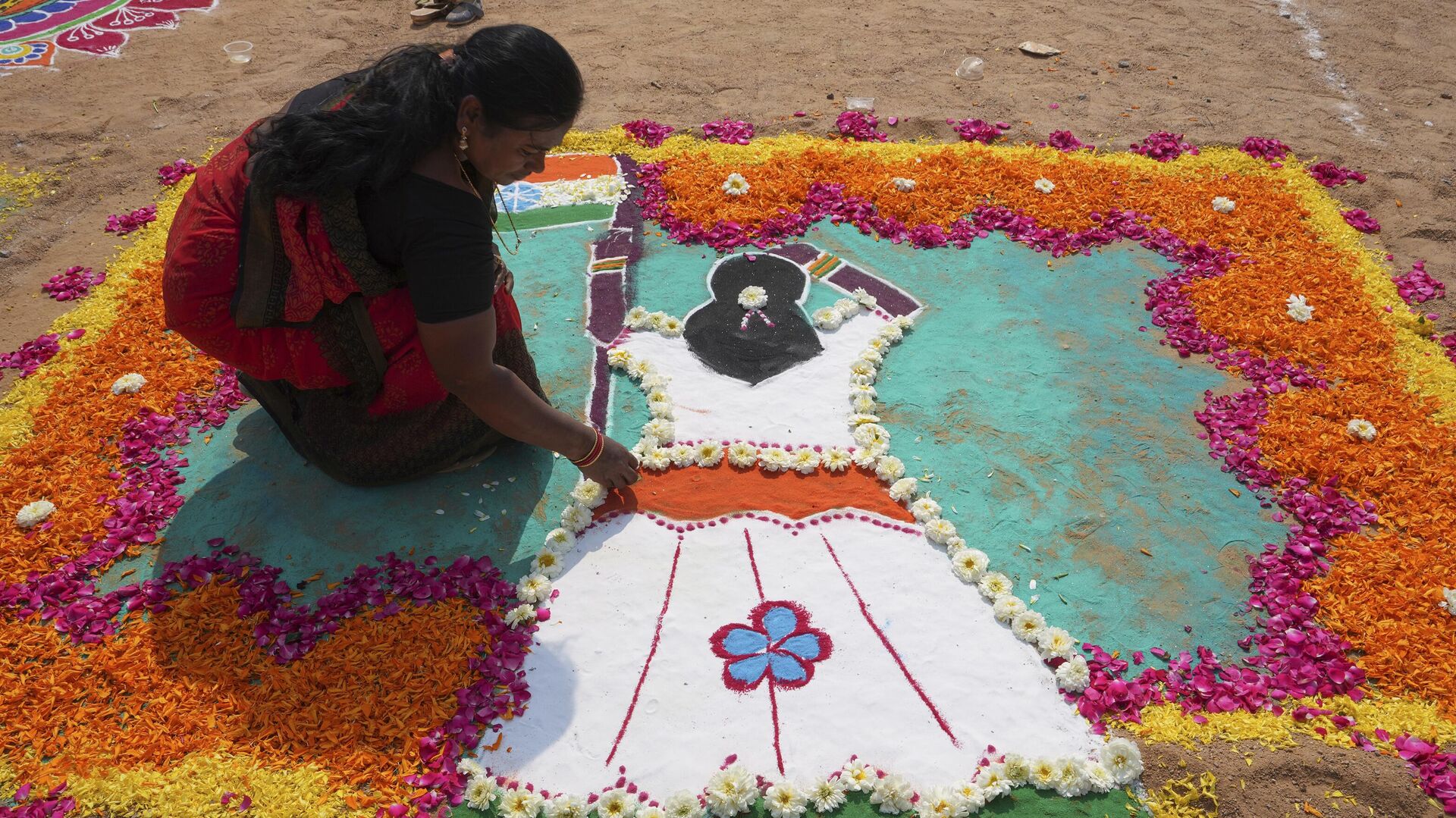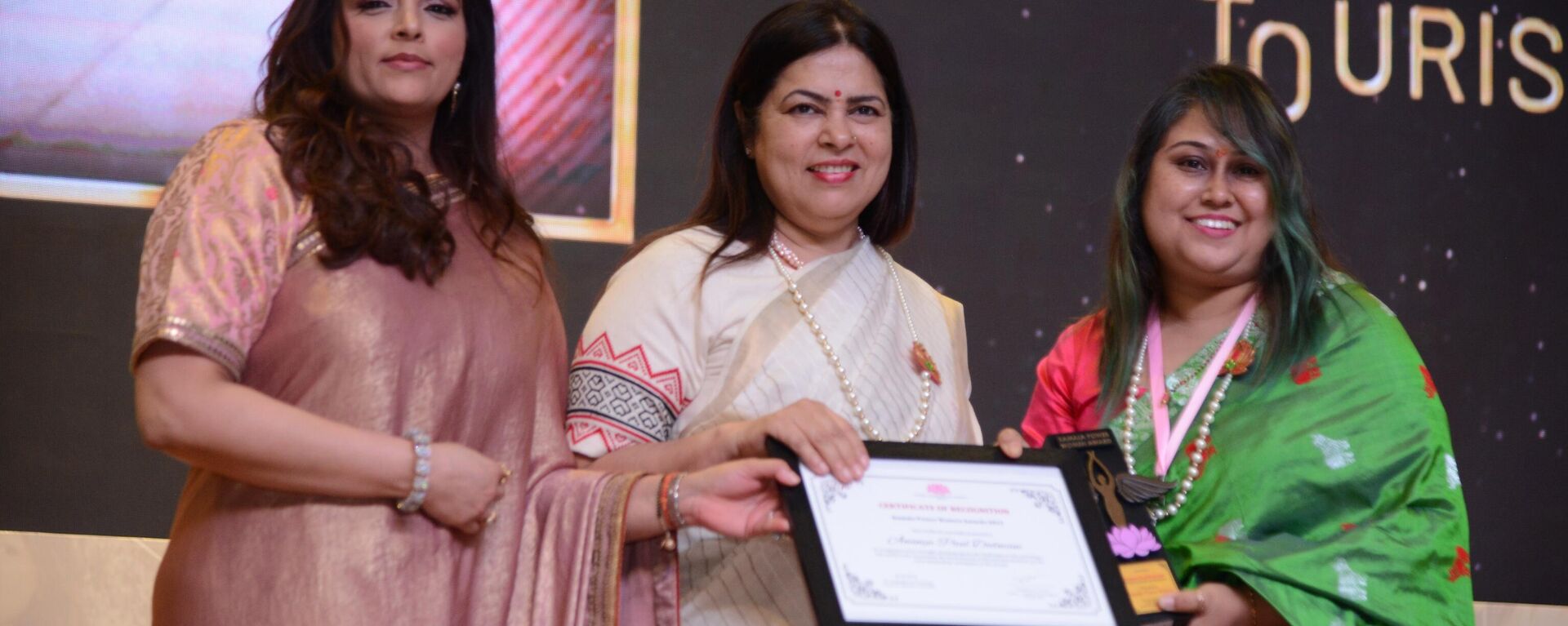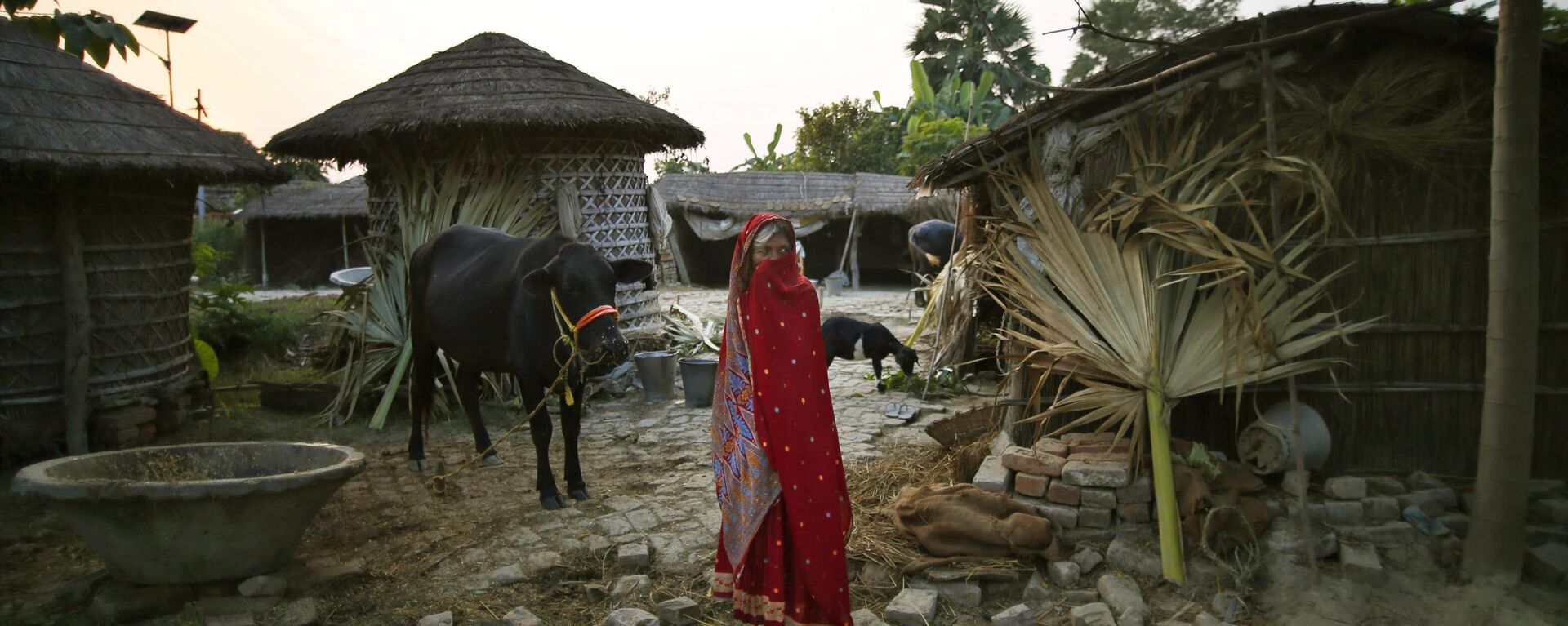https://sputniknews.in/20230316/women-in-politics-boosts-overall-development-telangana-lawmaker-1188322.html
Women in Politics Boosts Overall Development: Telangana Lawmaker
Women in Politics Boosts Overall Development: Telangana Lawmaker
Sputnik India
Female representation in the Indian parliament's lower house has risen since 1951 from 22 to 78. However, a number of political parties demand that one-third... 16.03.2023, Sputnik India
2023-03-16T19:12+0530
2023-03-16T19:12+0530
2023-03-16T19:12+0530
sputnik opinion
india
delhi
new delhi
telangana
women empowerment
women's rights
women's education
https://cdn1.img.sputniknews.in/img/07e7/03/10/1199321_0:0:3133:1762_1920x0_80_0_0_5c5a68ad681a062945dffaec1fb99c5c.jpg
India's Paliament first introduced the Women's Reservation Bill in 1996 in order to secure one-third of the Lok Sabha (lower house) and state legislative assembly seats for female lawmakers. Following a number of re-introductions, the bill was finally approved by the Rajya Sabha (upper house) in 2010, but it lapsed in 2014. Since, the bill has not been re-introduced.To demand the introduction of the Women's Reservation Bill to parliament once again, K. Kavitha, a member of Telangana's Legislative Council and daughter of Telangana state chief K. Chandrashekhar Rao, held a peaceful sit-in protest on March 10 in Delhi.The protest by attended by several opposition party members, women's organizations, and representation from all 29 states.In an interview with Sputnik, Kavitha talks about the importance of the Women’s Reservation Bill, the significance of female political representation, and how it can help overall development.Why is the Bill Important?Sputnik: The Rajya Sabha (upper house) approved the Women’s Reservation Bill in 2010. But it lapsed with the Lok Sabha’s (lower house) in 2014. Why do you think it was not introduced after that?Kavitha: Well, I believe that tremendous political will is needed to introduce the Women's Reservation Bill. The current government, which got elected in 2014, claimed to bring the bill as part of their election manifesto. Neither has it showed any interest to bring the bill nor did any opposition parties put any pressure.However, parliamentarians of our party constantly requested the government, on every occasion, to introduce the bill as it was their poll promise. But somehow the government never did.In 1996, H.D. Deve Gowda was the first prime minister to introduce the bill. Since then, every prime minister repeatedly tried until 2014. It is really unfortunate that from 2014 until now, Prime Minister Narendra Modi has not made any effort towards introducing the bill.Sputnik: There has never been a political consensus on the Women’s Reservation Bill. Do you think you can bring the political parties onto the same page on the issue now?Kavitha: Yes. I agree that there was no political consensus and it was lacking because the discussion was about having a quota within a quota from few parties.See, the party which tabled the bill then – Congress – was never committed to having a census of Other Backward Class (OBC) and giving them a clear quota. But today our party Bharat Rashtra Samithi (BRS) has proposed multiple solutions.First and foremost, we demand that the census of the nation happen immediately. Then we also demand that the OBC census should also be done because we have done it in our state (Telangana). When the state was formed in 2014, we took the census of the whole state in one single day by deploying 450,000 government employees all across the state. So, we know what our domain of people is. Any country should know the domain of its people. This is the reason why we have been demanding that the census should happen, OBC census should happen, and then the reservation can be extended based on the population. But somehow this government has always evaded it which is very unfortunate and that is why now this issue will come up.However, my request to all the political parties has been: let the government table the bill first then we all can collectively explore options.India is a country full of brilliant and amazing minds. There are social scientists who have found solutions to various problems so they can easily find solutions to this problem as well.We should honor the wishes of every political party to the best possible extent and bring the bill. In order to do that the government should come up and first give a draft bill at least.Sputnik: The participation of women in parliament has been increasing gradually since independence in 1947. Do you think women will eventually be able to take seats in parliament without the bill?Kavitha: It is highly unlikely they will take the number of seats they should ideally be taking. There, probably, will be an incremental increase in the number like in 1952 we had 22 women parliamentarians. And today we have 78. So, in more than 70 years we were able to add only 50. It means that in the next 70 or 75 years, we’ll be able to add 50 more which will still not meet the quota amount which we are asking.Therefore, without affirmative action, without an even playground, not everybody can perform equally to their fullest capacity, and women of this country irrespective of caste and creed and section have always been treated as second-grade citizens. However, this has been a phenomenon world-over, not only in India.So, women have to be given quotas, otherwise, their political participation to the extent which is required cannot happen and exponential growth in their participation cannot happen.New Female Leaders Emerging in IndiaSputnik: As per constitutional amendments, one-third of seats in rural and urban local governments are reserved for women. But mostly men dominate the politics. Why is this so? Is it because women don't want to enter politics, or do men not allow them to do so?Kavitha: Well, you should understand that there has been very good progress since 1993 when one-third reservation was given to the women in the local government. Since then, one important change has happened which is that now India has 29 states, of which except eight states, rest of the 21 states today give 50 percent reservation to women, both in urban local bodies and rural local bodies. So the participation of women has increased in 20 years.Yes, you are right that earlier, until the last ten years probably, there was a situation where if there was a woman sarpanch (head of village-level constitutional body) her husband would take over and take the decision. The woman only signed the papers.In another district, there is a girl who resigned from Infosys to contest local body polls and now she is the chairman of the entire district.So, there are people who are very well-educated, want to understand things, change things at the grassroots level, and are coming up. This has not happened overnight but over a period of time.Similarly, if we introduce the women’s reservation bill in parliament tomorrow you can’t expect all the independent women to come, and that’s fine. To begin with, we should allow women to come up, then independent women will automatically start coming because when they will understand that there is a seat for them and if they work hard they can get there. Leadership will automatically develop.Suppresion of Women is Not Limited to India OnlySputnik: India is widely regarded as a male-dominated society, where women still face suppression despite decades of independence. Do you think that instead of demanding reservation for them, there should be a demand for effective means of empowering women?Especially when we increase the quota for women at the local bodies, we did not see the crime go up - rather it gets reported and it gets controlled at the local level itself. There is constant protection given to victims by the local women leaders as well. So that has been the case across.I believe the girls are getting more educated and more empowered now. I think there will be a downward trend in the crime against women. If not so at least there will be a positive uptrend in reporting the crimes. That is what I believe and both are welcome steps.As far as the political representation of women helping in their empowerment is concerned, I think that it will surely help. For example, when you see a statue of Mahatma Gandhi on a road you get inspired by just looking at it. Likewise, when you see a woman stand up in the parliament and speak, knowingly or unknowingly, millions of girls watching her will be inspired. If not all but a few of them will get to know that this is where they can reach.Even if it doesn’t happen then they will at least develop an understanding that they have to stand up for their rights in whichever sphere they are in.So, if a statue can instill a spirit to fight for their rights in any person then through 180 women, if this reservation bill passes, in Indian Parliament talking about various issues will inspire millions of girls in the country.Sputnik: Will parliamentarians from your party take up the issue in the ongoing parliamentary session?Kavitha: Absolutely. The parliamentarians of our party will take up the issue. But as of now the focus of all the opposition parties is on Joint Parliamentary Committee over Adani-Hindenburg issue. We are just waiting for a roundtable conference because we have given the data to all the parties that what tools can be used inside the Parliament to take up the issue like introducing a Private Member Bill, raising questions in regard to the present status of the bill, raise the issue of the bill as a matter of importance during zero hour and several others.We also gave them a drafted bill that could be introduced as a Private Member Bill. We have also drafted some questions which can be raised in the House.Apart from this, there is a case in the Supreme Court in which all the political parties have to give an affidavit which is pending. So we have also requested all the political parties to give their affidavit in the Supreme Court. So, things are moving and we are chasing all the parties.Sputnik: In what way will India's political landscape change once women get a larger representation in politics?Kavitha: What usually happens is when a woman is given a position or power or a place of responsibility, she not only works for herself but she works for the overall development. This is because of their motherly instinct in her where she takes care of every last person in need with her unending patience.I have been in public life for 17 years. I attend to each and every one who meets me with utmost care. That is something that is, you know, innate in the nature of a woman. So that will lead to a lot of confidence, peace, and problem solving if not anything else.
https://sputniknews.in/20230316/kamala-power-women-awards-championing-women-who-bring-change-to-society-1179248.html
https://sputniknews.in/20230315/indian-female-literacy-rate-up-68-since-independence-1178664.html
india
delhi
new delhi
telangana
Sputnik India
feedback.hindi@sputniknews.com
+74956456601
MIA „Rossiya Segodnya“
2023
Rahul Trivedi
https://cdn1.img.sputniknews.in/img/07e6/0c/13/136500_0:0:628:627_100x100_80_0_0_72097ff894c7446b70d2efafcb719720.jpg
Rahul Trivedi
https://cdn1.img.sputniknews.in/img/07e6/0c/13/136500_0:0:628:627_100x100_80_0_0_72097ff894c7446b70d2efafcb719720.jpg
News
en_IN
Sputnik India
feedback.hindi@sputniknews.com
+74956456601
MIA „Rossiya Segodnya“
Sputnik India
feedback.hindi@sputniknews.com
+74956456601
MIA „Rossiya Segodnya“
Rahul Trivedi
https://cdn1.img.sputniknews.in/img/07e6/0c/13/136500_0:0:628:627_100x100_80_0_0_72097ff894c7446b70d2efafcb719720.jpg
k. kavitha, women's reservation bill, kavitha stages protest in jantar mantar, bharat rashtra samithi, k. chandrashekhar rao
k. kavitha, women's reservation bill, kavitha stages protest in jantar mantar, bharat rashtra samithi, k. chandrashekhar rao
Women in Politics Boosts Overall Development: Telangana Lawmaker
Female representation in the Indian parliament's lower house has risen since 1951 from 22 to 78. However, a number of political parties demand that one-third of seats be reserved for women.
India's Paliament first introduced the Women's Reservation Bill in 1996 in order to secure one-third of the Lok Sabha (lower house) and state legislative assembly seats for female lawmakers.
Following a number of re-introductions, the bill was finally approved by the Rajya Sabha (upper house) in 2010, but it lapsed in 2014. Since, the bill has not been re-introduced.
To demand the introduction of the Women's Reservation Bill to parliament once again, K. Kavitha, a member of Telangana's Legislative Council and daughter of Telangana state chief K. Chandrashekhar Rao, held a peaceful sit-in protest on March 10 in Delhi.
The protest by attended by several opposition party members, women's organizations, and representation from all 29 states.
In an interview with Sputnik, Kavitha talks about the importance of the Women’s Reservation Bill, the significance of female political representation, and how it can help overall development.
Why is the Bill Important?
Sputnik: The Rajya Sabha (upper house) approved the Women’s Reservation Bill in 2010. But it lapsed with the Lok Sabha’s (lower house) in 2014. Why do you think it was not introduced after that?
Kavitha: Well, I believe that tremendous political will is needed to introduce the Women's Reservation Bill. The current government, which got elected in 2014, claimed to bring the bill as part of their election manifesto. Neither has it showed any interest to bring the bill nor did any opposition parties put any pressure.
However, parliamentarians of our party constantly requested the government, on every occasion, to introduce the bill as it was their poll promise. But somehow the government never did.
In 1996, H.D. Deve Gowda was the first prime minister to introduce the bill. Since then, every prime minister repeatedly tried until 2014. It is really unfortunate that from 2014 until now, Prime Minister Narendra Modi has not made any effort towards introducing the bill.
Sputnik: There has never been a political consensus on the Women’s Reservation Bill. Do you think you can bring the political parties onto the same page on the issue now?
Kavitha: Yes. I agree that there was no political consensus and it was lacking because the discussion was about having a quota within a quota from few parties.
See, the party which tabled the bill then – Congress – was never committed to having a census of Other Backward Class (OBC) and giving them a clear quota. But today our party Bharat Rashtra Samithi (BRS) has proposed multiple solutions.
First and foremost, we demand that the census of the nation happen immediately. Then we also demand that the OBC census should also be done because we have done it in our state (Telangana).
When the state was formed in 2014, we took the census of the whole state in one single day by deploying 450,000 government employees all across the state. So, we know what our domain of people is.
Any country should know the domain of its people. This is the reason why we have been demanding that the census should happen, OBC census should happen, and then the reservation can be extended based on the population.
But somehow this government has always evaded it which is very unfortunate and that is why now this issue will come up.
However, my request to all the political parties has been: let the government table the bill first then we all can collectively explore options.
India is a country full of brilliant and amazing minds. There are social scientists who have found solutions to various problems so they can easily find solutions to this problem as well.
We should honor the wishes of every political party to the best possible extent and bring the bill. In order to do that the government should come up and first give a draft bill at least.
Sputnik: The participation of women in parliament has been increasing gradually since independence in 1947. Do you think women will eventually be able to take seats in parliament without the bill?
Kavitha: It is highly unlikely they will take the number of seats they should ideally be taking. There, probably, will be an incremental increase in the number like in 1952 we had 22 women parliamentarians. And today we have 78. So, in more than 70 years we were able to add only 50. It means that in the next 70 or 75 years, we’ll be able to add 50 more which will still not meet the quota amount which we are asking.
Therefore, without affirmative action, without an even playground, not everybody can perform equally to their fullest capacity, and women of this country irrespective of caste and creed and section have always been treated as second-grade citizens. However, this has been a phenomenon world-over, not only in India.
So, women have to be given quotas, otherwise, their political participation to the extent which is required cannot happen and exponential growth in their participation cannot happen.
New Female Leaders Emerging in India
Sputnik: As per constitutional amendments, one-third of seats in rural and urban local governments are reserved for women. But mostly men dominate the politics. Why is this so? Is it because women don't want to enter politics, or do men not allow them to do so?
Kavitha: Well, you should understand that there has been very good progress since 1993 when one-third reservation was given to the women in the local government. Since then, one important change has happened which is that now India has 29 states, of which except eight states, rest of the 21 states today give 50 percent reservation to women, both in urban local bodies and rural local bodies. So the participation of women has increased in 20 years.
Yes, you are right that earlier, until the last ten years probably, there was a situation where if there was a woman sarpanch (head of village-level constitutional body) her husband would take over and take the decision. The woman only signed the papers.
However, over a period of time, new women leaders have emerged who have come up on their own and have an understanding of things. For example, in Telangana, there is a corporator in Hyderabad urban local body who resigned from her job at Google and contested the local body polls.
In another district, there is a girl who resigned from Infosys to contest local body polls and now she is the chairman of the entire district.
So, there are people who are very well-educated, want to understand things, change things at the grassroots level, and are coming up. This has not happened overnight but over a period of time.
Similarly, if we introduce the women’s reservation bill in parliament tomorrow you can’t expect all the independent women to come, and that’s fine.
To begin with, we should allow women to come up, then independent women will automatically start coming because when they will understand that there is a seat for them and if they work hard they can get there. Leadership will automatically develop.
Suppresion of Women is Not Limited to India Only
Sputnik: India is widely regarded as a male-dominated society, where women still face suppression despite decades of independence. Do you think that instead of demanding reservation for them, there should be a demand for effective means of empowering women?
Kavitha: First of all, the atrocities and suppression of women are a global phenomenon and not restricted to India only. India is now educated enough to report many of these crimes which earlier were not reported. So the increased number of reporting also looks like increased number of crimes but it is not the case.
Especially when we increase the quota for women at the local bodies, we did not see the crime go up - rather it gets reported and it gets controlled at the local level itself. There is constant protection given to victims by the local women leaders as well. So that has been the case across.
I believe the girls are getting more educated and more empowered now. I think there will be a downward trend in the crime against women. If not so at least there will be a positive uptrend in reporting the crimes. That is what I believe and both are welcome steps.
As far as the political representation of women helping in their empowerment is concerned, I think that it will surely help. For example, when you see a statue of Mahatma Gandhi on a road you get inspired by just looking at it. Likewise, when you see a woman stand up in the parliament and speak, knowingly or unknowingly, millions of girls watching her will be inspired. If not all but a few of them will get to know that this is where they can reach.
Even if it doesn’t happen then they will at least develop an understanding that they have to stand up for their rights in whichever sphere they are in.
So, if a statue can instill a spirit to fight for their rights in any person then through 180 women, if this reservation bill passes, in Indian Parliament talking about various issues will inspire millions of girls in the country.
Sputnik: Will parliamentarians from your party take up the issue in the ongoing parliamentary session?
Kavitha: Absolutely. The parliamentarians of our party will take up the issue. But as of now the focus of all the opposition parties is on Joint Parliamentary Committee over
Adani-Hindenburg issue.
We are just waiting for a roundtable conference because we have given the data to all the parties that what tools can be used inside the Parliament to take up the issue like introducing a Private Member Bill, raising questions in regard to the present status of the bill, raise the issue of the bill as a matter of importance during zero hour and several others.
We also gave them a drafted bill that could be introduced as a Private Member Bill. We have also drafted some questions which can be raised in the House.
Apart from this, there is a case in the Supreme Court in which all the political parties have to give an affidavit which is pending. So we have also requested all the political parties to give their affidavit in the Supreme Court. So, things are moving and we are chasing all the parties.
Sputnik: In what way will India's political landscape change once women get a larger representation in politics?
Kavitha: What usually happens is when a woman is given a position or power or a place of responsibility, she not only works for herself but she works for the overall development. This is because of their motherly instinct in her where she takes care of every last person in need with her unending patience.
I have been in public life for 17 years. I attend to each and every one who meets me with utmost care. That is something that is, you know, innate in the nature of a woman. So that will lead to a lot of confidence, peace, and problem solving if not anything else.
Apart from this, women can be very tough in taking decisions. Women always have been at the forefront to take the toughest of calls in families, offices, and other places. So, I believe an overall development can happen if women enter into the political arena.




